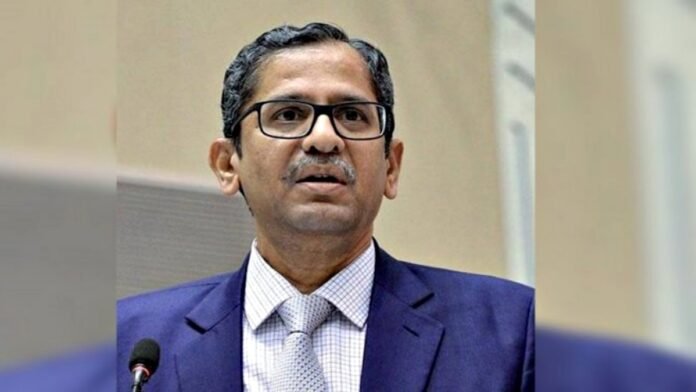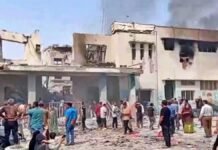
Key Points:
- Former Chief Justice of India NV Ramana disclosed on November 2, 2025, that criminal cases were filed against his family members to pressure and “coerce” him during previous YSRCP government
- Made revelation at 5th convocation of VIT-AP University in Amaravati on Andhra Pradesh Formation Day (November 1)
- Without directly naming Jagan Mohan Reddy’s government, Justice Ramana said judiciary members who upheld constitutional principles faced pressure and persecution
- His daughters were booked by YSRCP government in 2019 for allegedly abusing official position to buy land in Amaravati with prior knowledge of capital status
- In 2020, Andhra Pradesh High Court stayed investigation and issued injunction against media reporting on FIR contents
- Former CM Jagan wrote unprecedented letter to then-CJI SA Bobde alleging Justice Ramana was “influencing” AP High Court to favor opposition TDP
- Supreme Court dismissed Jagan’s complaint about a year later after in-house procedure
- Justice Ramana praised Amaravati farmers for their five-year struggle (2019-2024) against three-capitals formula and thanked them for trusting judicial system
- Amaravati capital project revived and progressing rapidly under current CM Chandrababu Naidu’s government
Amaravati: Former Chief Justice of India NV Ramana made a stunning public revelation on Saturday, November 2, 2025, alleging that criminal cases were deliberately filed against his family members to “coerce” and pressure him during the previous YSR Congress Party (YSRCP) government’s tenure in Andhra Pradesh. Speaking at the fifth convocation ceremony of Vellore Institute of Technology-Andhra Pradesh (VIT-AP) University held in Amaravati, Justice Ramana broke his silence on the politically sensitive issue that had created waves in legal and political circles during his tenure as the Chief Justice.
Emotional Revelation at VIT-AP Convocation
Addressing students, faculty, and dignitaries at the convocation ceremony held on Andhra Pradesh Formation Day (November 1), Justice Ramana spoke candidly about the personal toll of his professional responsibilities. Though he did not explicitly name the YS Jagan Mohan Reddy-led YSRCP government, his references made it abundantly clear which administration he was alluding to.
“All of you present here, most of you present here, know how my family was targeted and criminal cases were filed against them. All this was done only to coerce me, and I was not alone,” Justice Ramana stated emphatically. He further revealed that the pressure extended beyond him to other members of the judiciary who upheld constitutional principles, saying that “even members of the judiciary who upheld the constitutional principles faced pressure and persecution. Families of judges who had no role became collateral to political organisations”.
The former CJI emphasized that “during that difficult phase, all those who empathised with the cause of the farmers faced intimidation and coercion,” indicating the broader pattern of alleged suppression during the contentious Amaravati capital controversy.
The Amaravati Capital Controversy
Justice Ramana’s remarks were directly connected to the protracted farmers’ agitation against the then-YS Jagan Mohan Reddy government’s decision to scrap Amaravati as the sole capital of Andhra Pradesh. The YSRCP government had proposed a controversial “three capitals” formula that would have trifurcated the state’s capital functions, making Visakhapatnam the administrative capital, Amaravati the legislative capital, and Kurnool the judicial capital.
This proposal triggered massive protests from farmers and landowners in the Amaravati region who had given up their agricultural lands for the capital city’s construction under the previous Telugu Desam Party (TDP) government led by N Chandrababu Naidu, hoping to receive developed plots in an urbanized region in exchange. The farmers sustained their struggle for five years from 2019 until 2024, facing what Justice Ramana described as “constant suffering”.
Criminal Cases Against Justice Ramana’s Daughters
The controversy surrounding Justice Ramana’s family became public in 2019 when his daughters were booked by the YSRCP government for allegedly abusing their official position to purchase land in Amaravati. The allegations centered on claims that they had prior knowledge of Amaravati’s selection as the capital before it was officially announced to the public, thereby gaining an unfair advantage in land purchases.
In 2020, the Andhra Pradesh High Court intervened by staying the investigation into the alleged corruption case in which several persons, including Justice Ramana’s daughters, were named. Significantly, the High Court also issued an injunction against any media reporting on the contents of the First Information Report (FIR), preventing further public dissemination of the allegations.
Jagan’s Unprecedented Letter to CJI
The situation escalated dramatically when former Chief Minister YS Jagan Mohan Reddy took the extraordinary step of writing directly to the then-Chief Justice of India SA Bobde, leveling serious allegations against Justice Ramana, who was next in line to become the Chief Justice. This letter made waves across the legal and political establishment as it was possibly the first time ever in India that a politician from a ruling party wrote to the CJI regarding a senior judge.
In his letter, Jagan alleged that Justice Ramana had been “influencing” the functioning of the Andhra Pradesh High Court to act in favor of the TDP, which was in opposition at the time. He claimed a “nexus” between Justice Ramana, the TDP, and certain judges of the Andhra Pradesh High Court, further accusing the senior judge of influencing the High Court’s roster and thereby manipulating the outcome of many cases.
The Supreme Court eventually dismissed Jagan’s complaint approximately a year later after following an “in-house procedure,” effectively clearing Justice Ramana of the allegations. Justice Ramana subsequently went on to serve as the 48th Chief Justice of India from April 2021 to August 2022.
“Moments When Duty Becomes Painfully Personal”
Reflecting on these turbulent times at the VIT-AP convocation, Justice Ramana described how public service sometimes exacts a heavy personal cost. “There are moments in public life when the conviction towards your duty becomes painfully personal,” he said, acknowledging the emotional and psychological toll of maintaining judicial independence in the face of political pressure.
He emphasized that when many political leaders hesitated to take a stance or remained silent during the Amaravati controversy, it was “the jurists, lawyers, and the courts of this country who stood by their constitutional promise”. Justice Ramana stressed that “while governments may change, the courts and rule of law remain the anchor of stability. And the rule of law survives only when people repose their public trust, decline to surrender their integrity for convenience”.
Deep Personal Connection to Amaravati
Justice Ramana revealed his profound emotional connection to Amaravati, stating, “Amaravati is very close to my heart because its soil, air, and water have shaped my life as a student leader and a lawyer”. He further observed that “present-day Amaravati owes its existence to the resilience of the farmers of this region. The city survives on the back of the farmers’ struggle, one of the longest in southern India”.
Expressing his admiration and solidarity with the protesting farmers, Justice Ramana declared, “I salute the spirit of the farmers of Amaravati, who courageously withstood the forces of the government mechanism. I draw a lot of inspiration from the farmers’ struggle”. He also thanked the farmers “for reposing their trust in the judicial system and the democratic process,” acknowledging their faith in constitutional remedies despite facing severe government pressure.
Revival of the Amaravati Project Under the New Government
Justice Ramana’s address comes at a time when the political landscape in Andhra Pradesh has completely transformed. After the YSRCP’s defeat in the 2024 elections, N Chandrababu Naidu’s TDP-led coalition returned to power, and one of the new government’s first priorities was reviving the Amaravati capital project.
The farmers’ five-year agitation finally bore fruit as the controversial three-capitals formula was formally dropped, and Amaravati was once again designated as the sole capital of Andhra Pradesh. Following Chief Minister N Chandrababu Naidu’s government taking charge, the Amaravati capital project was immediately revived, and construction works are now reportedly progressing at a faster pace.
Broader Context of Judicial Independence
Justice Ramana’s revelations have significant implications for discussions about judicial independence and the separation of powers in India’s democratic framework. His statement that “families of judges who had no role became collateral to political organisations” highlights the vulnerability of judicial officers and their relatives to political pressure tactics.
The former CJI’s decision to speak publicly about these experiences, albeit after his retirement, underscores the challenges faced by the judiciary in maintaining its independence when confronted with determined political opposition. His assertion that he “was not alone” in facing such pressure suggests that the phenomenon may be more widespread than publicly acknowledged.
Educational Message to Students
Despite the political nature of his revelations, Justice Ramana also used the platform to deliver a message about education’s role in society. He emphasized that education must serve society and that institutions of higher learning have a responsibility to produce citizens who uphold constitutional values and democratic principles.
His personal story of facing political persecution while maintaining judicial integrity served as a powerful lesson for the graduating students about the importance of courage, conviction, and commitment to constitutional ideals even when faced with severe personal consequences.
As the Amaravati capital project moves forward under the new government and Justice Ramana’s family is no longer under the cloud of politically motivated criminal cases, his convocation address serves as both a vindication of his stance and a cautionary tale about the pressures that can be brought to bear on independent constitutional functionaries in India’s complex political environment.












































